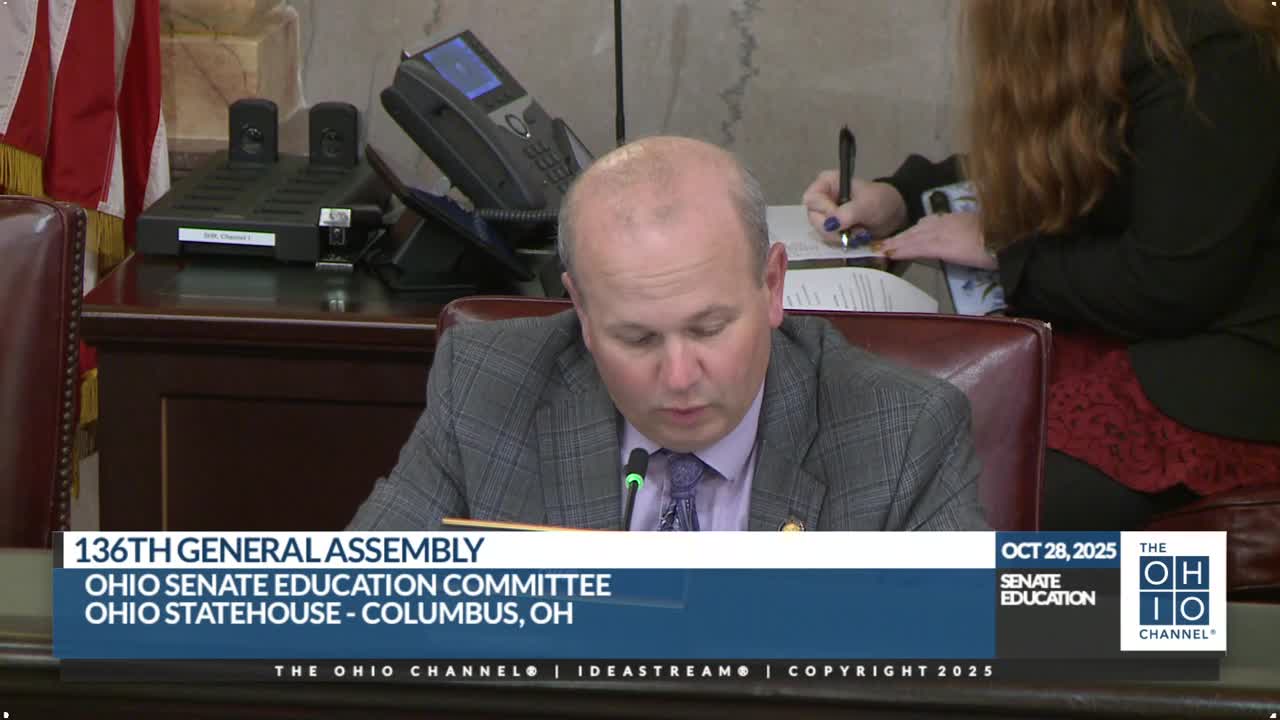Future Ready 5 tells Senate panel its early‑childhood checks and teacher training raised literacy benchmarks 65%
Get AI-powered insights, summaries, and transcripts
Subscribe
Summary
A representative of Future Ready 5 told the Ohio Senate Education Committee on an informational visit that the nonprofit’s combination of regular early‑learning assessments, teacher training and parent outreach produced a 65% increase in literacy benchmark scores from fall to spring among 750 children served across about 50 centers in Central Ohio.
A representative of Future Ready 5 told the Ohio Senate Education Committee on an informational visit that the organization’s combination of regular early‑learning assessments, teacher training and parent outreach produced a 65% increase in literacy benchmark scores from fall to spring among 750 children served across about 50 centers in Central Ohio.
Future Ready 5 made the presentation to Chair Senator Brenner and committee members, arguing the early years matter because “90% of the human brain is largely developed by the age of 5,” and saying Ohio’s kindergarten readiness results show most children currently enter kindergarten behind. The group said its approach centers on frequent, standards‑aligned checkups for children and monthly professional development for teachers tied to specific interventions.
The group described its model in four elements: a collaborative of centers and family providers that agree to standardized assessments; early learning “checkups” two to three times per year that tie to kindergarten standards; intensive teacher training and coaching; and parent workshops plus a remote tablet program for families. The presenter said the program began with 13 centers and about 165 children and now serves roughly 50 centers and 750 children. Teachers in the cohort receive nine full‑day trainings per year and monthly accountability check‑ins, and the presenter said the cohort has had 94% teacher retention.
Future Ready 5 said its literacy assessment (called The Reading House in the presentation) maps to the state kindergarten readiness assessment (KRA) and is used to identify targeted interventions — for example, short rhyming interventions when a child shows a rhyming deficit. The presenter described anecdotal examples in which assessors found children could read but their classroom teachers had not realized it until the checkup.
On costs, the presenter said the program’s current per‑student operating cost is just under $2,000, and that the broader early‑childhood cost is roughly $10,000–$12,000 per child; the group said it aims to reduce per‑child cost further if scaled or supported by public funding. The group also described a tablet program funded by AT&T that uses Khan Academy Kids, enabling assignments and data to flow to staff for family engagement and remote interventions.
The presenter said the organization secured a data agreement with the Department of Children and Youth (DCY) that will allow matching the SSID numbers of children served to their subsequent kindergarten readiness assessment results and follow those cohorts over time. The group said it has already submitted its first request for KRA results and will share outcomes with the committee when available.
During committee questions, Vice Chair Blessing said he broadly supports universal pre‑K and asked why a smaller, accountability‑focused effort should be pursued; the presenter replied they support universal pre‑K but argued it must be paired with measurement and accountability. Ranking Member Ingram and other senators asked about facilities used (YMCA sites for teacher training) and parent engagement; the presenter said monthly 30‑minute parent workshops are offered and that attendance remains a challenge, noting the tablet program as an additional strategy for family engagement and rural outreach.
The presenter cited research and framing from the Harvard Center on the Developing Child, NAEP data on reading, and economist James Heckman’s return‑on‑investment work, and said early investments can yield long‑term economic benefits. The organization requested continued interest from the committee and said it will provide DCY‑matched KRA results as they arrive.
Committee members did not take formal action on the presentation; the session moved to other bills after questions.
